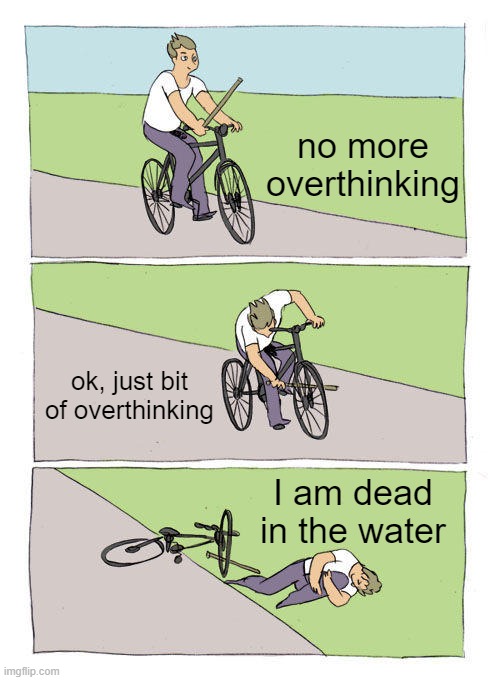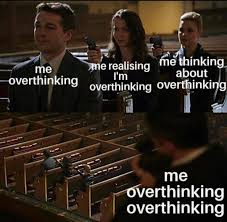Do you ever find yourself replaying a conversation in your head long after it’s over? Maybe it’s that lighthearted joke you make at work or the way you replied to your friend’s text. Hours later, you are wide awake, dissecting every word. These seemingly harmless habits are actually signs of overthinking, cloaked as random thoughts.
As an overthinker, your mind spins with endless “what ifs” about situations that haven’t even happened yet. It’s like being stuck in an ongoing loop: replaying the past, amplifying doubts, and inventing future scenarios.
Everyone, at some point, gets caught up in overthinking, but for some, it’s a constant background noise. A noise that gradually steals their peace of mind. If these scenarios sound relatable, let’s pull back the curtain and unmask six subtle signs of overthinking you probably ignored before.

Silent Signs of Overthinking
Here are the 6 quiet indicators of you being an overthinker:
1. Replaying Conversations Like a Broken Record
You obsessively revisit past conversations and interactions as if trying to solve a nonexistent mystery! Thoughts like, “Did I sound rude?”, “Should I have phrased it differently?”, “What if they took it the wrong way?” keep hitting you.
You scrutinize every tiny detail until your self-esteem hits rock bottom. You forcefully remind yourself to stop overthinking, but the vicious cycle traps you in an endless re-run.
2. Creating Endless “What If” Scenarios
These “what if” stimulations are one of the classic signs of overthinking.
What if I fail this project?
What if I hurt them with my opinion?
What if they don’t like me?
On the surface, it feels like being cautious, but in reality, you are predicting disasters that probably won’t even happen. Your brain becomes so drained running its endless imaginations, you end up being anxious when the situation actually appears. These worst-case outcomes prevent you from enjoying the moment, and eventually, you start living in a future that doesn’t exist.
Read: 60 Journal Prompts For Mental Health To Quiet The Noise In Your Mind
3. Decision Paralysis: Struggling With Simple Choices
Imagine you are sitting in a cozy restaurant with friends, menu in hand. Instead of quickly picking the dish you’re craving, your brain shifts into overthinking. “What if the pasta isn’t good? What if I regret not ordering the burger? Maybe I should get what my friend is having so I don’t miss out. But what if that’s not filling enough?”
And suddenly, the simple choice of what to eat turns out to be a high-stakes contract! As an overthinker, you might find making simple decisions to be monumental. This leaves you mentally exhausted. Honestly, you don’t always have to choose ‘correctly’.
4. Assuming the Worst-Case Scenario
There’s no evidence that something might happen, and you have already leaped to the worst possible outcome. Catastrophizing is a sneaky pattern of overthinking. Your mind is in a constant state of tension, and this doom thinking blinds you.
Every awkward pause in a conversation doesn’t mean the end of a friendship, and every email from your boss doesn’t mean you’ll be fired. Such thoughts just spike your anxiety and leave no room for fresh perspectives.

5. Overanalyzing People’s Reactions
Overthinkers have a natural talent for turning small, everyday interactions into full-blown investigations, a perfect storyline for a thriller! Thoughts like, “Why did she say that in such a tone?” or “Does he secretly hate me?” keep bombarding your brain.
Such behaviour breeds tension and sparks unnecessary conflicts. These are often signs of overthinking, where you might pull away or act up based on assumptions rather than facts, only to realize later that your fears weren’t even true.

6. Never Feeling “Good Enough”
One of the most damaging patterns of overthinking is that it makes you your harshest critic. Instead of acknowledging your strengths, you zoom in on tiny imperfections. Successes feel small and mistakes (both real and imagined) feel huge.
This constant cycle of self-questioning sucks your confidence, creating the illusion that whatever you do is never enough. Unconsciously, you downplay your talents, and eventually stop going after opportunities altogether because you have convinced yourself you’ll fall short.
How to Stop Overthinking?
After you are done spotting the signs, here’s how you can break free from the cycle of overthinking:
- Pause and check reality – When your brain starts spiraling, ask yourself: “Do I actually have facts, or is this just my imagination running wild?” This simple pause can calm your senses and save you from endless fake scenarios.
- Set time limits on decisions – Overthinking and indecision go hand in hand. Set a mental timer, say 5 minutes, for deciding on something minor. This teaches your brain that not every decision deserves hours of debate.
- Challenge the worst-case scenario – Learn to flip the script. If your brain questions “What if everything goes wrong?”, simply question back “What if it goes right?” Just shifting your perspective from fear to possibility can break the cycle of doom thinking.
- Write it out – Writing out thoughts that are trapped in your head can actually help stop overthinking. Now you can view them as an observer instead of being consumed by them.
- Practice self-compassion – Let go of the belief that you must be flawless. No one is. Speak to yourself with kindness and encouragement instead of invalid judgments. This fuels your spark of optimism. A casual reminder like, “I did my best today, and that’s enough,” can be surprisingly powerful.
Read: 8 Simple Micro Rituals To Calm You And Clear Your Head

Wrapping It Up: One Thought at a Time
Your mind is meant to be your guide, not your prison guard. Replaying that one sentence you said three days ago is exhausting, isn’t it? These are subtle signs of overthinking you need to let go of and embrace positivity.
There is calmness and freedom waiting for you at the end of those constant ‘what ifs’. Life is meant to be lived out loud: with joy, messy conversations, and mistakes. So, the next time you catch yourself overthinking, replace the “what if” with “why not?”
Frequently Asked Questions (FAQs)
What is overthinking?
Overthinking is when your mind won’t stop replaying situations, imagining worst-case scenarios, or analyzing every detail. It’s like your brain’s stuck in a loop, turning small things into big worries. It can drain your energy and make decision-making harder than it needs to be. Basically, it’s thinking too much for too long.
How to stop overthinking?
To stop overthinking, try focusing on the present moment. Deep breathing helps. Write your thoughts down to clear your mind. Set time limits for decisions, and remind yourself that not everything needs a perfect answer. Distract yourself with something you enjoy. Most importantly, be kind to yourself. Nobody has it all figured out.
What is the root cause of overthinking?
The root cause of overthinking is often fear of making mistakes, being judged, or not being good enough. It can also come from past experiences or anxiety. Your brain’s trying to protect you, but it ends up stressing you out instead. It’s a mix of wanting control and struggling to let go.








